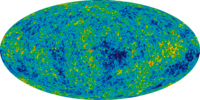
Effects of self-consistent rest-ultraviolet colours in semi-empirical galaxy formation models
Sign Up to like & getrecommendations! Published in 2020 at "Monthly Notices of the Royal Astronomical Society"
DOI: 10.1093/mnras/staa2586
Abstract: Connecting the observed rest-ultraviolet (UV) luminosities of high-$z$ galaxies to their intrinsic luminosities (and thus star formation rates) requires correcting for the presence of dust. We bypass a common dust-correction approach that uses empirical relationships… read more here.
Keywords: galaxy formation; formation; semi empirical; rest ultraviolet ... See more keywords

Joint galaxy–galaxy lensing and clustering constraints on galaxy formation
Sign Up to like & getrecommendations! Published in 2020 at "Monthly Notices of the Royal Astronomical Society"
DOI: 10.1093/mnras/staa2675
Abstract: We compare predictions for galaxy-galaxy lensing profiles and clustering from the Henriques et al. (2015) public version of the Munich semi-analytical model of galaxy formation (SAM) and the IllustrisTNG suite, primarily TNG300, with observations from… read more here.
Keywords: galaxy; galaxy lensing; stellar mass; galaxy formation ... See more keywords

The hot gas distribution, X-ray luminosity and baryon budget in the L-Galaxies semi-analytic model of galaxy formation
Sign Up to like & getrecommendations! Published in 2022 at "Monthly Notices of the Royal Astronomical Society"
DOI: 10.1093/mnras/stac3735
Abstract: Hot ionized gas is important in the baryon cycle of galaxies and contributes the majority of their “missing baryons”. Until now, most semi-analytic models of galaxy formation have paid little attention to hot gaseous haloes… read more here.
Keywords: gas; hot gas; ray; galaxy formation ... See more keywords

Galaxy formation in the Planck cosmology – IV. Mass and environmental quenching, conformity and clustering
Sign Up to like & getrecommendations! Published in 2017 at "Monthly Notices of the Royal Astronomical Society"
DOI: 10.1093/mnras/stx1010
Abstract: We study the quenching of star formation as a function of redshift, environment and stellar mass in the galaxy formation simulations of Henriques et al. (2015), which implement an updated version of the Munich semi-analytic… read more here.
Keywords: galaxy formation; cosmology; mass; conformity ... See more keywords

Simulating galaxy formation with the IllustrisTNG model
Sign Up to like & getrecommendations! Published in 2018 at "Monthly Notices of the Royal Astronomical Society"
DOI: 10.1093/mnras/stx2656
Abstract: We introduce an updated physical model to simulate the formation and evolution of galaxies in cosmological, large-scale gravity+magnetohydrodynamical simulations with the moving mesh code AREPO. The overall framework builds upon the successes of the Illustris… read more here.
Keywords: galaxy formation; illustristng model; formation; formation illustristng ... See more keywords

Comparing galaxy formation in semi-analytic models and hydrodynamical simulations
Sign Up to like & getrecommendations! Published in 2018 at "Monthly Notices of the Royal Astronomical Society"
DOI: 10.1093/mnras/stx2770
Abstract: It is now possible for hydrodynamical simulations to reproduce a representative galaxy population. Accordingly, it is timely to assess critically some of the assumptions of traditional semi-analytic galaxy formation models. We use the EAGLE simulations… read more here.
Keywords: semi analytic; galaxy formation; angular momentum; galform ... See more keywords

The IRX-β dust attenuation relation in cosmological galaxy formation simulations
Sign Up to like & getrecommendations! Published in 2018 at "Monthly Notices of the Royal Astronomical Society"
DOI: 10.1093/mnras/stx2860
Abstract: We utilise a series of high-resolution cosmological zoom simulations of galaxy formation to investigate the relationship between the ultraviolet (UV) slope, beta, and the ratio of the infrared luminosity to UV luminosity (IRX) in the… read more here.
Keywords: galaxy formation; irx beta; relation; beta relation ... See more keywords

A new gas cooling model for semi-analytic galaxy formation models
Sign Up to like & getrecommendations! Published in 2018 at "Monthly Notices of the Royal Astronomical Society"
DOI: 10.1093/mnras/stx3218
Abstract: Semi-analytic galaxy formation models are widely used to gain insight into the astrophysics of galaxy formation and in model testing, parameter space searching and mock catalogue building. In this work, we present a new model… read more here.
Keywords: galaxy formation; model; cooling; gas ... See more keywords

NIHAO XII: galactic uniformity in a ΛCDM universe
Sign Up to like & getrecommendations! Published in 2017 at "Monthly Notices of the Royal Astronomical Society"
DOI: 10.1093/mnras/stx458
Abstract: We use a sample of 83 high-resolution cosmological zoom-in simulations and a semi-analytic model (SAM) to study the stochasticity of galaxy formation in haloes ranging from dwarf to Milky Way masses. Our simulated galaxies reproduce… read more here.
Keywords: galaxy formation; formation; scatter; cdm universe ... See more keywords

The frequency of very young galaxies in the local Universe: I. A test for galaxy formation and cosmological models
Sign Up to like & getrecommendations! Published in 2018 at "Monthly Notices of the Royal Astronomical Society"
DOI: 10.1093/mnras/sty507
Abstract: In the local Universe, the existence of very young galaxies (VYGs), having formed at least half their stellar mass in the last 1 Gyr, is debated. We predict the present-day fraction of VYGs among central… read more here.
Keywords: local universe; galaxy formation; mass; halo ... See more keywords

Supernova feedback in numerical simulations of galaxy formation: Separating physics from numerics
Sign Up to like & getrecommendations! Published in 2017 at "Monthly Notices of the Royal Astronomical Society"
DOI: 10.1093/mnras/sty994
Abstract: While feedback from massive stars exploding as supernovae (SNe) is thought to be one of the key ingredients regulating galaxy formation, theoretically it is still unclear how the available energy couples to the interstellar medium… read more here.
Keywords: galaxy formation; feedback; physics; formation ... See more keywords